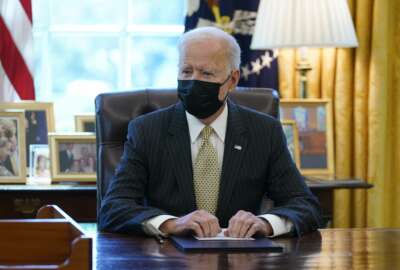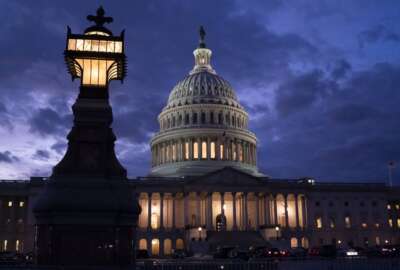CR signed but new contracting initiatives still won’t start until spring
The latest continuing resolution will keep the government funded somehow until Feb. 18. But it means any fresh initiatives won't have a chance to get underway until...
Best listening experience is on Chrome, Firefox or Safari. Subscribe to Federal Drive’s daily audio interviews on Apple Podcasts or PodcastOne.
The latest continuing resolution will keep the government funded somehow until Feb. 18. But it means any fresh initiatives won’t have a chance to get underway until March at the earliest, nearly halfway through the fiscal year. For what that means to contractors, the Federal Drive with Tom Temin turned to federal sales and marketing consultant, Larry Allen.
Interview transcript:
Tom Temin: So what does it mean, Larry? They can’t do much for a long time.
Larry Allen: Tom, I think it means a really long period of preparation for government contractors, an extended period of going and talking about what you can do, what your customer agencies may be planning, having all of their projects, to use a term, shovel ready. So that the minute the appropriations money hits the account, they can get to work. But it also means that in terms of overall business, until we get those final spending accounts, things are probably going to be a little slow. If you’re fortunate enough to be able to work on an ongoing procurement or project, then you’re going to be able to continue to do that. If you’ve got some one-off business that doesn’t rely on appropriated funds, say something funded by a capital account that some agencies have, again, those are highly specific, you might be able to do some work on those. But for the vast majority of contractors and agencies who have plans to do new work in FY ’22, we’re on hold. We’re on hold probably, as you say until March, which means that we are going to have quite a Ride of the Valkyries for the last six months of the fiscal year. If, this is by no means certain, we do end up with final appropriations sometime in the late winter or early spring.
Tom Temin: Technically, contractors have more leeway to work on new projects that could come after the CR than the government itself does because the CR proscribes activities, spending anything on new projects. So that includes the man hours people might be doing for planning and setting requirements. They may do it anyway. But it’s almost like working during a shutdown: You’re not allowed to, period.
Larry Allen: Well, that’s part of the issue about working during a CR, Tom. You have to make sure things that you’re doing like monthly maintenance, are you going to get paid for that? A lot of agencies will say sure, you’re going to get paid because we have the dollars. But they’re not going to be able to do anything like a yearly contract or even any contract that would take them beyond the period of time for which they’ve been given funds. And you also do want to make sure as a contractor that you’re going through. Those … software license renewals, the subscription renewals, the maintenance packages that you’re providing to your customers, you’ve got to talk to the contracting officer to make sure that when you’re performing work on these things, you’re going to get paid. Because you can’t always take for granted that merely because the money’s there that you have taken all the necessary contractual steps to ensure that it comes to you. More than one contractor has assumed incorrectly, A) the CR passed, I’m going to continue to get paid, only to find that the contracting officer said, well, the authorization for you to work on this deal expired, and we never renewed it. So thank you for your service.
Tom Temin: So this happens, you’ve seen this happen?
Larry Allen: I have seen it happen. It doesn’t happen very often. But it happens often enough that it’s worth a word of caution to contractors. Don’t assume check with the contracting officer, not the court, not the end user. But the contracting officer just to make sure that the fine print is in place and enables you to continue getting paid.
Tom Temin: Yeah, what I was talking about, though, in terms of what the government can do for something that they would have launched as a new project in 2022, that is launching last Oct. 1, they can’t even work on those projects in the absence of having an award to carry it out. Because that’s spending government money on a new project.
Larry Allen: That’s right, unless they’ve got an alternative funding source for all or part of that project Tom, we are stuck in neutral, the lights aren’t really even on. Think of it as a long period of time and people are starting line while the starters on a four-month vacation. So it gets frustrating for everybody gets frustrating for government agencies. This is really no way to run an agency. It’s not good from an agency management standpoint. It’s frustrating for contractors, because contractors would like to be able to launch in and get some business they want to get money in the pipeline, particularly if they’re small contractors. That’s how they survive. So the longer we have a CR, it’s not that everything’s fine. Everything’s not fine, it’s not as bad as if it would be if we were shut down. But we’re really operating with one, maybe one-and-a-half hands, depending on the agency tied behind our back.
Tom Temin: And remember when that starter does start the race, they shoot blanks. We’re speaking with Larry Allen, president of Allen Federal Business Partners. And let me ask you about something else you’ve pointed out this week, and that is the GSA is threatening on order status suspension. There’s something new that contractors have to do coming from GSA on top of every other requirement that’s been heaped on in recent months.
Larry Allen: Right, because it’s not enough that we just stopped talking about a CR, Tom, and the slow business that’s gonna lead to. In the meantime, that hasn’t stopped the Office of Management and Budget and the regulatory wheels from turning out new requirements on vaccine mandates, scrims supply chain security management, Section 889 B, telecommunications requirements, minimum wage, a whole host of other requirements that are going to hit contractors in the pocketbook that they have to comply with. So GSA thought, hey, why not pile on? This is a great time to send out a directive to schedule contractors, saying if you don’t change your GSA Advantage systems to show order status in a couple of months, we’re gonna just turn your Advantage listing off, as well as the e-buy listing. Why not? If you’re going to go in for nickel, in for a dime, in for a dollar, in for 100, right, Tom? I mean, it just seems like really bad timing on GSA’s part to do this. And there are a lot of reasons why. I mean, first of all –
Tom Temin: Well, what is the significance of order tracking requirements under the GSA Advantage? What does that really mean for contractors?
Larry Allen: Well, basically, Tom, what it means is that if you’re a federal buyer, and you placed an order through GSA Advantage, the contractor has to have a system now, that will allow you to track it, alright? The order has been placed, the purchase order’s been sent to the warehouse, the same type of thing you can get in your private lives when you’re doing business with FedEx, UPS, or even the Postal Service. They all have tracking capabilities for certain types of transactions. So GSA wants to have the same capability for advantage. Great idea in terms of customer service. I’m not suggesting that GSA shouldn’t have this capability. What I am suggesting is that to make it a mandate now, it really is kind of issuing a threat that says, do this by this date, or else. And the contractor’s like really, because again, I don’t have enough to do right now? So I’ve got to do this? Who does this hit the hardest, Tom? Well, probably really hits small business schedule contractors the hardest. A great number of GSA contractors already have this capability. Who are the ones that likely haven’t invested and put the cash into it are smaller businesses, smaller businesses that GSA administration says they want to do more with. Well, what exactly is more? Everybody kind of thought it was more business. But here, you can say, well, is “more” taking the small businesses to the woodshed and beating them up for not complying with this schedule mandate? It’s another burden that falls disproportionately on small businesses. And here’s the kicker, Tom, the truth is that nowhere near 5% of GSA Schedule orders go through Advantage. We’re talking about a percentage, small, small amount of orders that actually go through the system. So GSA’s mandate has the potential to disrupt a significant amount of the small business suppliers on their schedules program for almost no gain. Again, it’s great to have an order tracking system. Everybody wants to know where their orders are. I just think the agency could have put this in more perspective and said, in light of everything else that we’ve got going on, yeah, maybe we’ll push this one out a little bit?
Tom Temin: Memo to Robin [Carnahan, GSA administrator]. Larry Allen is president of Allen Federal Business Partners. Thanks so much.
Larry Allen: Tom, thank you and I wish your listeners happy selling.
Copyright © 2025 Federal News Network. All rights reserved. This website is not intended for users located within the European Economic Area.
Tom Temin is host of the Federal Drive and has been providing insight on federal technology and management issues for more than 30 years.
Follow @tteminWFED






